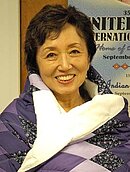Kyoko Norma Nozaki couldn’t help becoming emotional after entering the second–floor room in Building 32. From her vantage point, she could see the canteen her father frequented daily for 10 months as part of a group of American citizens of Japanese descent in an internment camp at Fort Lincoln in Bismarck, N.D., during World War II. Nozaki’s first visit to the site came more than 60 years after her father left the camp.
Nozaki’s story is a lesser-known piece of U.S. and North Dakota history, but a major part of her family’s life. Now a professor emeritus in the Department of Intercultural Studies at Kyoto Sangyo University, Japan, she will recount her family’s experience in a presentation, “Internment and Identity Shift: Through Transnational War Memory,” on Wednesday, April 24, from noon to 1:15 p.m. in the Memorial Union Century Theater. Part of NDSU’s Asian-American and Pacific Islander Heritage Month, the event is free and open to the public.
In 2007, Nozaki published “Internment and Identity Shift: Japan and America Through the Eyes of a Nisei and Sansei,” which delves into her Japanese American family history, including her father’s incarceration at Fort Lincoln, which functioned as an internment camp from 1941 to 1946. Despite being born in California, he was sent to the camp, leaving behind a wife and two young children in a War Relocation Authority camp in California.
“When I think about that time and circumstances, particularly about my mother, who was in her late 20s stranded with two small children and not certain if she would ever meet up with her husband again, my heart still aches,” Nozaki said.
In 2007, Nozaki visited the site, which is now home to United Tribes Technical College. Dennis J. Neumann, an NDSU alumnus who earned bachelor’s and master’s degrees in mass communication, is the public information officer for United Tribes Technical College. He will open Nozaki’s presentation by providing a photo-illustrated talk about Fort Lincoln, which held internees of Japanese and German descent and was operated by the Department of Justice’s Immigration and Naturalization Service.
Neumann said there is a low level of awareness about the camp today, as there was during the internment period. “Folks from the community weren’t allowed to enter,” he said. “Ten-foot high fences topped with barbed wire cordoned off a 500-by-1,300-foot section of camp. The only people to know much of anything were vendors making deliveries, law enforcement and people who came in contact with internees released to work in the community.”
Following the war, some stayed in North Dakota while Nozaki’s family moved to Japan to begin their post-war lives.
“Peace and harmony,” Nozaki said when asked about what she’s learned about her father’s experience. “I think it is the most important thing in human relationships as well as between ethnicities, races and countries. War cannot solve anything. It only scars the land and hurts the lives of millions of people.”
A reception is scheduled to follow the presentation in the Memorial Union’s Butte Lounge.
The presentation is sponsored by the Division of Equity, Diversity and Global Outreach. For accommodation requests or more information, call 701-231-5263 or email ndsu.edcenter@ndsu.edu.
NDSU is recognized as one of the nation's top 108 public and private universities by the Carnegie Commission on Higher Education.
